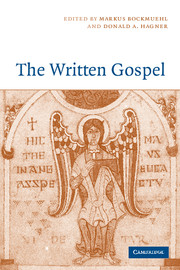Book contents
- Frontmatter
- Contents
- List of contributors
- List of abbreviations
- Introduction
- PART I BEFORE WRITING
- PART II WRITING THE FOUR GOSPELS
- PART III AFTER WRITING
- 11 The Four among Jews
- 12 The Four among pagans
- 13 Forty other gospels
- 14 The One, the Four and the many
- 15 The making of gospel commentaries
- Appendix: Graham Stanton's publications
- Bibliography
- Index of ancient sources
- Index of authors
11 - The Four among Jews
Published online by Cambridge University Press: 07 December 2009
- Frontmatter
- Contents
- List of contributors
- List of abbreviations
- Introduction
- PART I BEFORE WRITING
- PART II WRITING THE FOUR GOSPELS
- PART III AFTER WRITING
- 11 The Four among Jews
- 12 The Four among pagans
- 13 Forty other gospels
- 14 The One, the Four and the many
- 15 The making of gospel commentaries
- Appendix: Graham Stanton's publications
- Bibliography
- Index of ancient sources
- Index of authors
Summary
THE DIFFICULTIES OF THE TASK
Attempts to reconstruct Jewish opinion about Christianity in antiquity are dogged by a number of problems. These mainly arise from the character of the available sources. On the one hand we lack any substantial Jewish source on Christianity, and the fragmentary extant material is not without difficulty. On the other hand the Christian sources which apparently give us Jewish opinion about Christians are polemical in tone, and often repetitive and stereotypical in content. It has long been noted that to read off Jewish opinion from such texts is either misguided (see Taylor 1995) or at best a complex and nuanced task, involving the realization that such sources contain a difficult-to-decipher mixture of image and reality (see Lieu 1996).
These remarks are obviously relevant to the subject of this chapter, the Jewish knowledge of and interaction with the canonical Gospels. In this more limited context there are grounds both for pessimism and for optimism. Pessimism emerges from the limited character of the source material available. Interestingly, if we examine the Christian material which is termed ‘adversus Judaeos’, it is striking that it concerns itself much more with arguments about the scriptural (in Christian language, Old Testament) justification for Christian claims than with a defence of ‘ad hominem’ assertions against the figure of Jesus as he is recorded in the canonical Gospels. Why this might have been the case will be examined briefly below. On the other hand there are grounds for some optimism.
- Type
- Chapter
- Information
- The Written Gospel , pp. 205 - 221Publisher: Cambridge University PressPrint publication year: 2005



